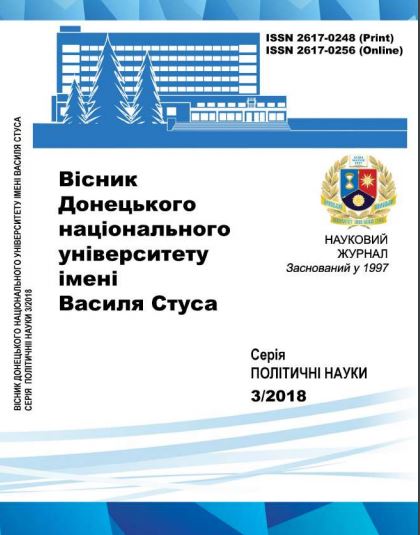Sovereignty: the problem of subjectivity.
DOI:
https://doi.org/10.31558/2617-0248.2018.3.3Keywords:
sovereignty, subjectivity, resource allocation, implementation powerAbstract
The author examines the concept of "subjectivity sovereignty" based on analysis of technology implementation. It is shown that technological features of the realization of sovereignty determine its intrinsic characteristics. These characteristics include the real power of power allocation of resources and powers, as well as political will as an ability to make targeted government decisions and willingness to allocate to them the maximum available resources and bear the associated risks.
The realization of sovereignty involves not only the transfer of the corresponding resources and powers of the administrative apparatus to the sovereign, but also the institutional consolidation of the organization of management with the internal system of redistribution of resources, authorities and the organized procedure for decision-making and control over their implementation. At the same time, the increased concentration of power resources in the hands of the trustee of resources helps to increase its independence from the sovereign and reduce its loyalty to it. As a result, the sovereign himself is forced to create and maintain an institution of administrators of formally belonging to him power resources and powers, which, in essence, limits his real sovereignty. The status of trustees of resources and authorities is dependent on the will of the sovereign and is temporary. However, the presence in their hands of the right to use virtually the entire volume of power resources on behalf of the sovereign creates for the latter a significant threat to their position of the supreme organizer of these resources.
From this it is clear that choosing a sovereign in making decisions is limited by the configuration of power positions of other centers of power. Hence the conclusion that the essence of subjectivity sovereignty lies not so much in the plane making independent state-making process, as in controlling the distribution and use of power resources and powers under the mechanism of the state.References
Аузан A.A. Институциональная экономика. Новая институциональная экономическая теория. / Под ред. А.А. Аузана. 2-е изд. Москва: Инфра-M. 2011.-466с.
Балабанова Е.С. Социально-экономическая зависимость: теория, история, современность: Монография / Е.С. Балабанова / Науч. ред. З.Х. Саралиева. – Нижний Новгород: Изд-во Нижегородско- го госуниверситета им. Н.И. Лобачевского, 2004. – 269 с.
Poggi G. Forms of Power / G. Poggi. –– Cambridge: Polity Press, 2001. –– Р. 136––284.
Михельс.Р (2006). Социология политической партии в усдовиях демократии. Политология: хрестоматия / Сост. проф. М.А. Василик, доц. М.С. Вершинин. —М.: Гардарики, 2000. 843 с.
Мочерний С. Національний та економічний суверенітет країни / С. Мочерний // Економіка України. – 2005. – №10. – С. 4-13.

